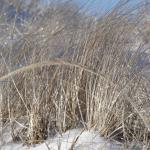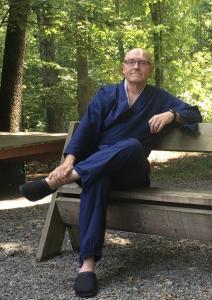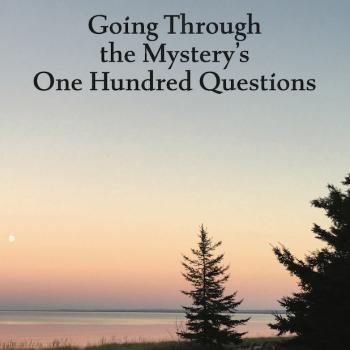In this post, you’ll find a selection from Going Through the Mystery’s One Hundred Questions. Also, a few years back, while I was in the midst of translating and commenting on these old cases, I gave a talk about this and included some excerpts from the awakening story of an incredible awakened woman from the 20th century, Yaeko Iwasaki. You can find the unedited version in The Three Pillars of Zen, “Part VI Yaeko Iwasaki’s Enlightenment Letters to Harada-roshi and his Comments.” Highly recommended and inspirational.
You can find the audio recording of the talk over on my Patreon site, along with an ad free version of this very post.
When I got to editing my comments of Going Through the Mystery for the final version, it just didn’t work to quote as much from Three PIllars as I had done in the talk, so below you won’t find the Yaeko Iwasaki material. The two versions work, text and talk, together well, seems to me.
Enjoy!
Click here to support my Zen teaching practice at Patreon of which translations and writings like this are one facet. You will also find an advertisement free version of this post there.
Question 18: What Conditions “No Place Not Known”?
Yuantong asked: “Prajna and ignorance. What conditions ‘no-place not-known’?”
Wansong replied: “Do not slander another’s good.”
Linquan’s Verse
Do not slander another’s good
A skillful explanation is not equal to the direct way
Just talking can cut off the subtle mystery
Then see the mind contriving the unproduced
Towering, towering, flying, flying self-thus faith
Sweep through the dead leaves of past positions
Commentary
Juxtaposed with prajna and ignorance, Yuantong asks what conditions 無所不知, no place not known, aka, omniscience.
Today, within a close teacher-student relationship, Yuantong might hear, “Oh my goodness, you are so in your head!”
I can still feel the sting of the verbal blows dished out by Katagiri Roshi to the young Dosho. With sadness in his eyes, seemingly wondering if he was wasting his life with students like me, he mutter almost to himself, “That’s just your thinking. Always”.
Wansong begins his an ancient scolding by pointing out that asking about omniscience, acting like he does not know, is itself slander of Yuantong’s original inheritance.
Linquan takes it from there, saying that talking about “no-place not-known” is a betrayal of the mystery.
But, thankfully, we are not left there.
Linquan points his index finger straight at the moon: “Towering, towering, flying, flying self-thus faith.”
“Self-thus” is the keyword here with “faith” slathered on for good measure. Towering, towering, 兀兀, originally referred to a table mountain and now means “determined,” “unmoving,” or “steadfast.” Dogen also useds this binomial, for example, in his “Healing Point of Zazen, along with 地, meaning “earth” or “ground,” so the phrase is translated as “steadfast sitting,” or “fixed sitting.” This phrase is a crucial teaching in Dogen Zen. “You should,” says Dogen,
investigate and receive the authentic transmission of steadfast sitting. This is the thorough study of steadfast sitting transmitted in the buddha way.
Linquan, though, rather than pair “towering, towering,” 兀兀, with 地, “ground,” pairs towering with “flying, flying,” 騰騰, for a much more dynamic expression.
In modern Chinese, the whole sentence, “Towering, towering, flying, flying self-thus faith,” sounds like this: wùwù téngténg xìn zìrú. But remember, “Just talking can cut off the subtle mystery.”
The invitation here is to embody the self-thus, towering and flying, and immediately, intimately “Sweep through the dead leaves of past positions.”
Dōshō Port began practicing Zen in 1977 and now co-teaches with his wife, Tetsugan Zummach Sensei, with Vine of Obstacles Zen, an online training group. Dōshō received dharma transmission from Dainin Katagiri Rōshi and inka shōmei from James Myōun Ford Rōshi in the Harada-Yasutani lineage. He is also the author of Keep Me In Your Heart a While: The Haunting Zen of Dainin Katagiri. Dōshō’s translation and commentary on The Record of Empty Hall: One Hundred Classic Koans, was published in 2021 (Shambhala). His third book, Going Through the Mystery’s One Hundred Questions, is now available. Click here to support the teaching practice of Dōshō Rōshi.














